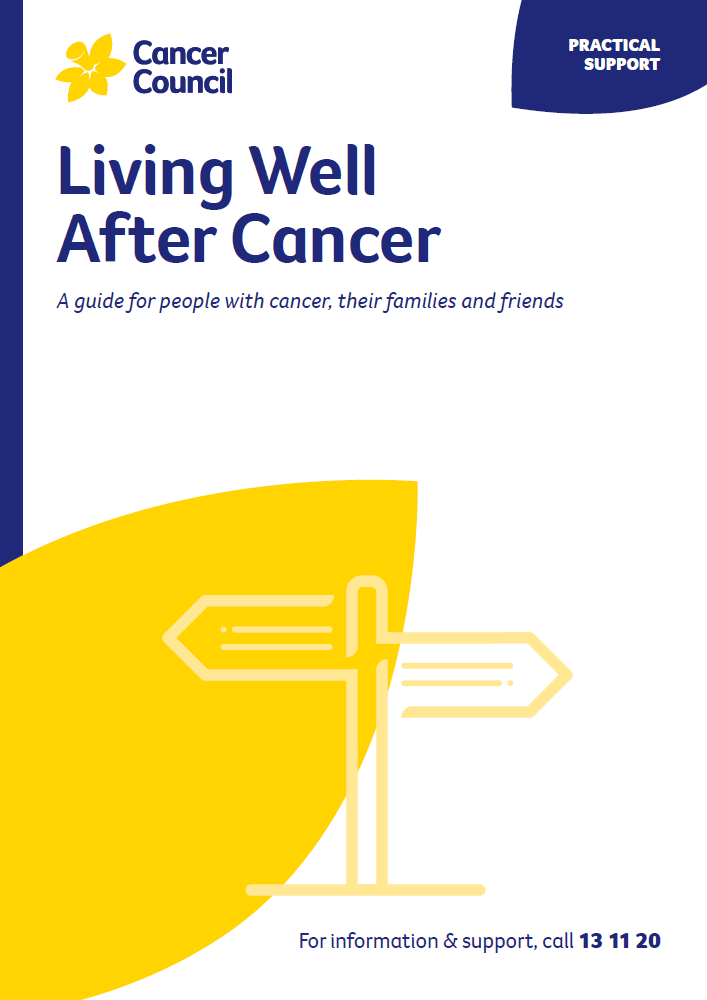- Home
- Kidney cancer
- Life after treatment
Life after treatment for kidney cancer
Navigating life after kidney cancer treatment? Below are some tips on adjusting to changes, establishing a new routine, and finding support for a new normal.
Learn more about:
- Overview
- Follow-up appointments
- Dealing with feelings of sadness
- Looking after yourself
- What if the cancer returns?
Overview
For most people, the cancer experience doesn’t end on the last day of treatment. Life after cancer treatment can present its own challenges. You may have mixed feelings when treatment ends, and worry that every ache and pain means the cancer is coming back.
Some people say that they feel pressure to return to “normal life”. It is important to allow yourself time to adjust to the physical and emotional changes, and establish a new daily routine at your own pace. Your family and friends may also need time to adjust.
Cancer Council 13 11 20 can help you connect with other people who have had kidney cancer, and provide you with information about the emotional and practical aspects of living well after cancer.
For more on this, see Living well after cancer.
Follow-up appointments
After treatment for early kidney cancer, you will have regular appointments to monitor your health, manage any long-term side effects and check that the cancer hasn’t come back or spread. During these check-ups, you will usually have a physical examination and you may have ultrasounds, CT scans or blood tests. Your doctor will talk to you about the follow-up schedule, which will depend on the risk of the cancer coming back.
If you have advanced kidney cancer, you will have appointments with your treatment team on an ongoing basis.
When a follow-up appointment or test is approaching, many people find that they think more about the cancer and may feel anxious. Talk to your treatment team or call Cancer Council 13 11 20 if you are finding it hard to manage this anxiety.
Check-ups will become less frequent if you have no further problems. Between follow-up appointments, let your doctor know immediately of any symptoms or health problems.
Dealing with feelings of sadness
If you have continued feelings of sadness, have trouble getting up in the morning or have lost motivation to do things that previously gave you pleasure, you may be experiencing depression. This is quite common among people who have had cancer.
Talk to your GP, because counselling or medication – even for a short time – may help. Some people can get a Medicare rebate for sessions with a psychologist. Cancer Council may also run a counselling program in your area.
For information about coping with depression and anxiety, call Beyond Blue on 1300 22 46 36. For 24-hour crisis support, call Lifeline 13 11 14.
Looking after yourself
Cancer can cause physical and emotional strain, so it’s important to look after your wellbeing. Cancer Council has free booklets and programs to help you during and after treatment.
Call 13 11 20 to find out more, or see Managing cancer side effects, Exercise after a cancer diagnosis, Complementary therapies, Emotions and cancer, Nutrition and cancer, Sexuality, intimacy and cancer, Fertility and cancer, and Living well after cancer.
Alternative therapies are therapies used instead of conventional medical treatments. These are unlikely to be scientifically tested and may prevent successful treatment of the cancer. Cancer Council does not recommend the use of alternative therapies as a cancer treatment.
What if the cancer returns?
For some people, kidney cancer does come back after treatment, which is known as a recurrence. It is important to have regular check-ups, so that if cancer does come back, it can be found early.
If the cancer recurs in the kidney (after a partial nephrectomy), you may be offered more surgery. If the cancer has spread beyond the kidney, your doctor may suggest targeted therapy, immunotherapy or radiation therapy, or occasionally, surgery.
→ READ MORE: Personal stories from people diagnosed with kidney cancer
Podcast for people affected by cancer
Listen now
More resources
Dr Alarick Picardo, Urologist, Fiona Stanley Hospital, WA (clinical review); Heidi Castleden, Consumer; Donna Clifford, Urology Nurse Practitioner, Royal Adelaide Hospital, SA; Prof Paul De Souza, Medical Oncologist and Professor of Medicine, Nepean Cancer Care Centre, The University of Sydney, NSW; Mike Kingsley, Consumer; Prof Declan Murphy, Urologist and Director of Genitourinary Oncology, Peter MacCallum Cancer Centre, VIC; Caitriona Nienaber, 13 11 20 Consultant, Cancer Council WA; Luke O’Connor, Urology Nurse, Royal Brisbane and Women’s Hospital, QLD; A/Prof Shankar Siva, Radiation Oncologist and Cancer Council Victoria Colebatch Fellow, Peter MacCallum Cancer Centre, VIC; A/Prof Homi Zargar, Uro-Oncologist and Robotic Surgeon, Western Health and Royal Melbourne Hospital, VIC.
View the Cancer Council NSW editorial policy.
View all publications or call 13 11 20 for free printed copies.

